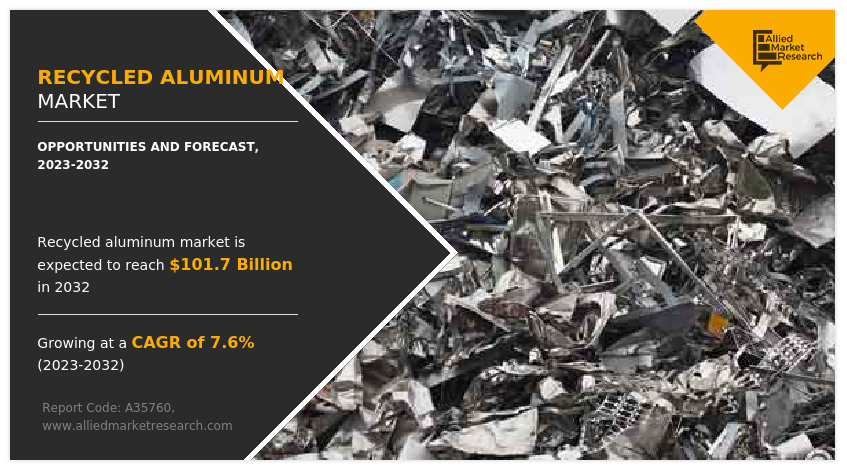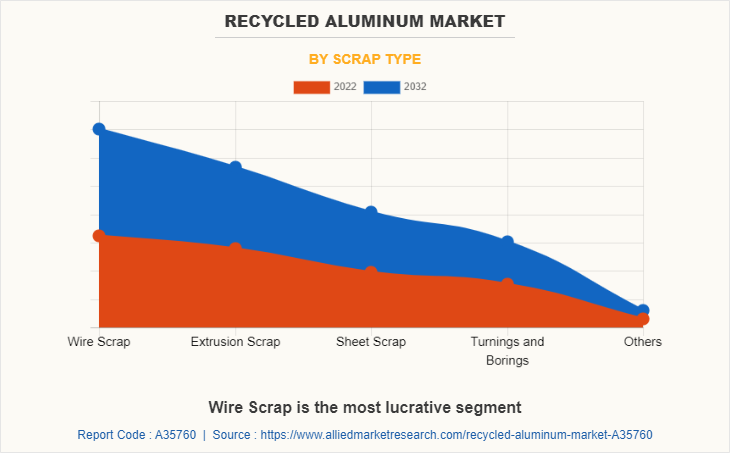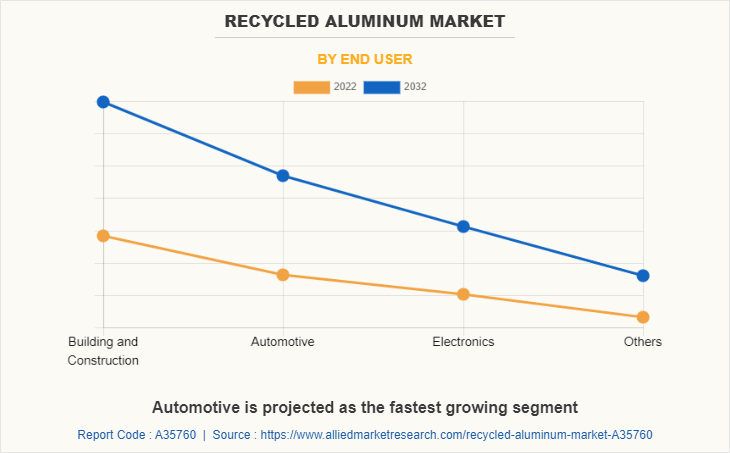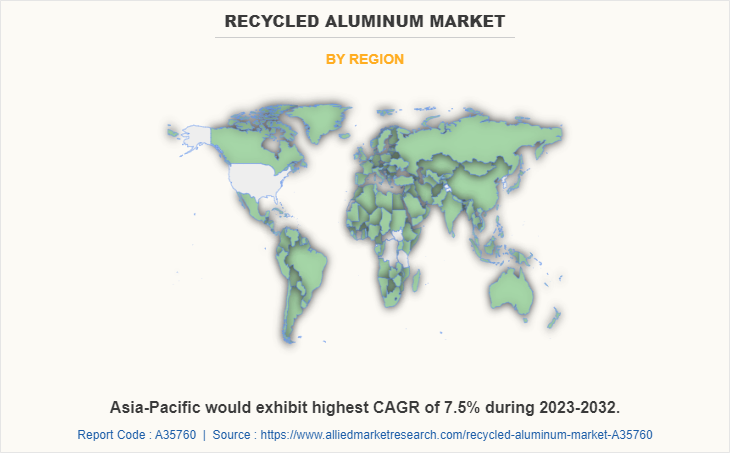Recycled Aluminum Market Research, 2032
The global recycled aluminum market was valued at $49.1 billion in 2022, and is projected to reach $101.7 billion by 2032, growing at a CAGR of 7.6% from 2023 to 2032.
Report Key Highlighters:
- The report provides competitive dynamics by evaluating business segments, product portfolios, target market revenue, geographical presence and key strategic developments by prominent manufacturers.
- The recycled aluminum market is fragmented in nature among prominent companies such as Novelis Inc., Constellium, Stena Aluminium, COHEN, REAL ALLOY, GAL Aluminium Extrusions Pvt. Ltd., STEINERT Global, and Kuusakoski oy.
- The study contains qualitative information such as the market dynamics (drivers, restraints, challenges, and opportunities), key regulation analysis, pricing analysis, and Porter’s Five Force Analysis across North America, Europe, Asia-Pacific, LAMEA regions.
- Latest trends in global recycled aluminum market such as undergoing regulatory guidelines associated with aluminum recycling, scrap collection, R&D activities, and government initiatives are analyzed across 16 countries in 4 different regions.
- More than 3,000 recycled aluminum-related product literatures, industry releases, annual reports, and other such documents of key industry participants along with authentic industry journals and government websites have been reviewed for generating high-value industry insights for global recycled aluminum market.

Recycled aluminum refers to aluminum that has been recovered and processed from post-consumer or post-industrial waste materials, rather than being extracted from raw sources. It is a sustainable and environmentally friendly alternative to primary aluminum production. The process involves collecting aluminum scrap, sorting, and processing it to remove impurities, melting it down, and shaping it into various forms for reuse. Recycled aluminum retains the same properties and characteristics as primary aluminum, making it suitable for a wide range of applications. By using recycled aluminum, we can conserve natural resources, reduce energy consumption, minimize waste, and contribute to a more sustainable and circular economy.
The surge in population base has led to rapid urbanization in both developed and developing economies such as the U.S., China, and India. This has increased government spending on the building & construction sector to develop various upcoming infrastructure projects. For instance, according to a report published by the National Investment Promotion and Facilitation Agency, infrastructure activities accounted for 13% share of the total foreign direct investment (FDI) inflows in 2021. Furthermore, rapid development of water supply, sanitation, urban transport, schools, and healthcare have aided the growth of the building & construction sector.
Recycled aluminum is commonly used for exterior building facades due to its lightweight nature, corrosion resistance, and ability to be easily formed into various shapes. It can be used for cladding systems, curtain walls, and decorative elements, providing a modern and aesthetically pleasing appearance. Moreover, recycled aluminum has become a popular choice for windows and doors in both residential and commercial buildings. It offers excellent strength, durability, and thermal performance. Aluminum frames can be slim and sleek, allowing for larger glass areas, maximizing natural light, and providing energy efficiency. Thus, the application of recycled aluminum ranges from structural components to architectural elements, contributing to sustainable and aesthetically appealing construction projects. This factor may act as one of the key drivers responsible for the growth of the recycled aluminum market in the growing building & construction sector.
Moreover, factors such as increase in disposable income, technological upgrades, and spurring rise in number of original equipment manufacturers (OEMs) have led the automotive & transportation sector to witness a significant growth. For instance, according to a report published by India Brands Equity Foundation, the domestic automobile production increased by a compound annual growth rate (CAGR) of 2.36% from 2016 to 2020 with 26.36 million vehicles being manufactured in India in 2020.
Recycled aluminum plays a significant role in the automotive and transportation sector, offering various benefits such as weight reduction, improved fuel efficiency, enhanced performance, and recyclability. Recycled aluminum is used in the construction of vehicle bodies and chassis to reduce weight while maintaining structural integrity. By substituting heavier materials such as steel, aluminum helps improve fuel efficiency and reduce emissions. It can be found in body panels, hoods, doors, trunk lids, and structural components such as subframes and crash structures. Moreover, recycled aluminum is used in engine components to reduce weight and improve thermal management. Engine blocks, cylinder heads, pistons, intake manifolds, and oil pans often incorporate aluminum, contributing to better performance, heat dissipation, and fuel efficiency. These factors altogether may enhance the demand for recycled aluminum in the automotive and transportation sector.
However, the availability of recycled aluminum can fluctuate depending on the collection and recycling infrastructure in place. Insufficient collection systems, limited recycling facilities, and inconsistent recycling rates can result in a shortage of recycled aluminum supply, which can hinder market growth. Furthermore, recycled aluminum may contain impurities or contaminants, such as paints, coatings, or other materials. These contaminants can affect the quality and performance of recycled aluminum, making it less desirable for certain applications. Sorting and removing contaminants can be a costly and challenging process, impacting the market's overall growth potential.
On the contrary, there is a surge in global demand for sustainable materials and a shift toward a circular economy. Recycled aluminum aligns with these trends as it offers reduced environmental impact and resource conservation. The increase in focus on sustainability and eco-friendly practices presents a significant opportunity for the growth of the recycled aluminum market. Moreover, governments across the glove have implemented policies and regulations to promote recycling and the use of recycled materials. These initiatives can include recycling targets, tax incentives, and green procurement policies. The support of governments through favorable regulations and incentives can create a conducive environment for the growth of the recycled aluminum market.
The recycled aluminum market is segmented on the basis of scrap type, end user, and region. On the basis of scrap type, the market is categorized into wire scrap, extrusion scrap, sheet scrap, turnings & borings, and others. On the basis of end-user, it is divided into building and construction, automotive, electronics, and others. Region-wise, the market is studied across North America, Europe, Asia-Pacific, and LAMEA.

In 2022, the wire scrap segment was the largest revenue generator, and is anticipated to grow at a CAGR of 8.0% during the forecast period. Recycling aluminum can be cost-effective for manufacturers. The energy savings mentioned above contribute to lower production costs. In addition, recycled aluminum is often less expensive than newly produced aluminum, making it an attractive option for wire scrap manufacturing. This has surged the demand for recycled aluminum market obtained from wire scrap. Moreover, manufacturing aluminum from recycled materials requires significantly less energy compared to producing aluminum from raw materials. It is estimated that recycling aluminum saves approximately 95% of the energy required for primary aluminum production. This energy efficiency translates into reduced carbon dioxide emissions and a lower carbon footprint for the wire scrap manufacturing process; thus, boosting the market growth.

By end user, the building and construction segment dominated the global market in 2022, and is anticipated to grow at a CAGR of 7.6% during forecast period. Recycled aluminum is uniquely utilized in the building and construction sector due to its exceptional combination of qualities, making it an ideal choice for sustainable construction practices. Recycled aluminum retains its strength and durability even after multiple recycling cycles. This characteristic makes it suitable for demanding construction applications where structural integrity is crucial. It provides long-lasting performance while reducing the need for frequent replacements and minimizing maintenance costs. This factor has surged the use of recycled aluminum in the growing building & construction sector; thus, boosting the market growth.
Moreover, one of the unique advantages of recycled aluminum is its lightweight nature. Compared to other construction materials, such as steel or concrete, recycled aluminum offers a significantly lower weight-to-strength ratio. This characteristic simplifies construction processes, reduces the load on structures, and enables the creation of innovative and sustainable designs. This factor may further surge the adoption of recycled aluminum in the building & construction sector.

The Asia-Pacific recycled aluminum market size is projected to grow at the highest CAGR of 8.0% during the forecast period and accounted for 49.1% of recycled aluminum market share in 2022. The expansion in building & construction, transportation, and chemical manufacturing has enhanced the performance of recycled aluminum in the Asia-Pacific. China's consumer electronics sector has grown rapidly, which in turn, has enhanced the performance of the recycled aluminum market in the region. According to a report published by the United Nations Statistics Division, China witnessed around 28.7% of the global manufacturing output for consumer electronic products in 2021.
In addition, countries such as India and Australia have witnessed a rapid increase in transportation sectors where recycled aluminum is employed to provide structural integrity in transportation equipment and increase their average lifespan. For instance, according to a report published by the Indian Ministry of Commerce and Industry, the transportation sector in India is expected to grow at a compound annual rate (CAGR) of 5.9% owing to the development of highways, widespread railway networks, aviation ports, and waterways structure. This may enhance the performance of the recycled aluminum market in Asia-Pacific.
The global recycled aluminum market profiles leading players that include Novelis Inc., Norsk Hydro ASA, JAIN RESOURCE RECYCLING PVT LTD., Constellium, Stena Aluminium, COHEN, REAL ALLOY, GAL Aluminium Extrusions Pvt. Ltd., STEINERT Global, and Kuusakoski oy. The global recycled aluminum market report provides in-depth competitive analysis as well as profiles of these major players.
Key Benefits For Stakeholders
- This report provides a quantitative analysis of the market segments, current trends, estimations, and dynamics of the recycled aluminum market analysis from 2022 to 2032 to identify the prevailing recycled aluminum market opportunities.
- The market research is offered along with information related to key drivers, restraints, and opportunities.
- Porter's five forces analysis highlights the potency of buyers and suppliers to enable stakeholders make profit-oriented business decisions and strengthen their supplier-buyer network.
- In-depth analysis of the recycled aluminum market segmentation assists to determine the prevailing market opportunities.
- Major countries in each region are mapped according to their revenue contribution to the global market.
- Market player positioning facilitates benchmarking and provides a clear understanding of the present position of the market players.
- The report includes the analysis of the regional as well as global recycled aluminum market trends, key players, market segments, application areas, and market growth strategies.
Recycled Aluminum Market Report Highlights
| Aspects | Details |
| Market Size By 2032 | USD 101.7 billion |
| Growth Rate | CAGR of 7.6% |
| Forecast period | 2022 - 2032 |
| Report Pages | 447 |
| By Scrap Type |
|
| By End User |
|
| By Region |
|
| Key Market Players | COHEN, Novelis Inc., STEINERT Global, Kuusakoski oy, Constellium, Norsk Hydro ASA, REAL ALLOY, Stena Aluminium, GAL Aluminium Extrusions Pvt. Ltd., JAIN RESOURCE RECYCLING PVT LTD. |
Analyst Review
The global recycled aluminum market is expected to exhibit high growth potential owing to the surge in focus on sustainability and reducing environmental impact, in which recycled aluminum helps conserve natural resources and reduces energy consumption, greenhouse gas emissions, and waste generation associated with primary aluminum production. In addition, the concept of a circular economy, which promotes the recycling and reuse of materials, has gained traction. Aluminum is highly recyclable, and the demand for recycled aluminum aligns with the principles of the circular economy. Industries and governments are actively promoting the use of recycled materials, including aluminum, to close the loop and reduce reliance on virgin resources. Furthermore, governments across the globe have implemented regulations and provide incentives to encourage recycling and the use of recycled materials. In some regions, there are mandates and targets for incorporating recycled content in products, including aluminum. These regulations and incentives create a favorable market environment and drive the demand for recycled aluminum.
Furthermore, CXOs added that sustained economic growth coupled with surge in utilization of recycled aluminum among various end use sectors may lead the recycled aluminum market to witness a significant growth.
Escalating demand from building and construction sector and robust demand from automotive and transportation sector are the upcoming trends of recycled aluminum market.
Building & construction, automotive, electronics, and others are the leading application of recycled aluminum market.
Asia-Pacific is the largest regional market for recycled aluminum market.
The recycled aluminum market was valued for $49.1 billion in 2022 and is estimated to reach $101.7 billion by 2032, exhibiting a CAGR of 7.6% from 2023 to 2032.
Novelis Inc., Norsk Hydro ASA, JAIN RESOURCE RECYCLING PVT LTD., Constellium, Stena Aluminium, COHEN, REAL ALLOY, GAL Aluminium Extrusions Pvt. Ltd., STEINERT Global, and Kuusakoski oy. are the top companies to hold prominent market share in recycled aluminum market.
Loading Table Of Content...
Loading Research Methodology...



